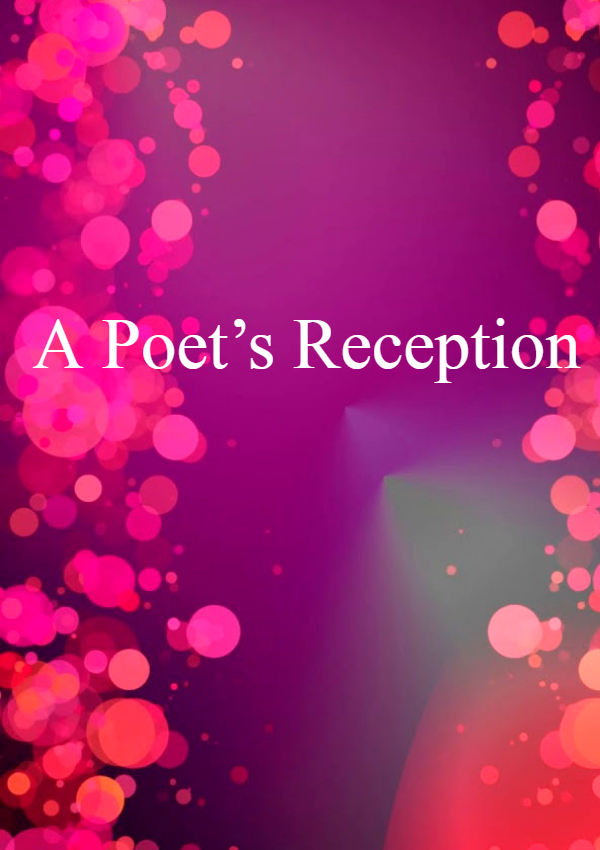A Poet’s Reception
A Poet’s Reception


The poet was agitated. Today he would be rewarded at 5 p. m at Tarun Sangha. He was pacing restlessly around the room. He was brooding over his address he was going to make before the audience. The car had not arrived yet. Were the streets clogged with processions, funeral or wedding or political? Were they simply jammed? And many such thoughts crossed his mind.
A while later there was a horn at the gate. The poet was relieved. He quietly came downstairs and slipped into the cab, and half an hour after reached his destination. The half-lit hall was jam-packed with beautiful faces. All eyes were on him. The dais was decorated with flowers and the image of the poet flashed on a giant screen. President, Secretary, Cashier and other honourable dignitaries of the club were exchanging words in a low voice. The poet was the sole topic.
“Ladies and gentlemen,” the anchor, a young dashing boy in a sweet voice began, “the world-famous poet is before you. Many of you, I know, have read him, recited him. We are all enthralled with the beauty of his pen! And government justifiably gave him the highest state honour. Our joy bounds no limit to have him here! Please give him a big hand!”
The hall was filled with applauses and echoes they made. Cameras frequently flashed.
“Friends! Our loved poet wrote more than a hundred books. Many of them are bestsellers. He also contributed to innumerable foreign journals. His poetry was translated into more than fifty languages all over the world. Four documentaries on the poet’s life and work have already been made. More we speak more we belittle him, I think. So I call Mr Mothi, the honourable secretary of our club, to offer a few words on today’s occasion. Then I would request our beloved poet to address the audience. Mr Mothi, please.” The boy grinned.
“It’s a huge honour to speak on this great occasion,” began Mr Mothi, a grey-haired, well-built, medium-height man. “First I on behalf of our club deeply regret our late reception of our son. Many clubs, organisations, and NGOs have already awarded him. Every other day our poet’s name and photos were flashed in TVs. And each daily honoured him. We are extremely happy with our son’s meteoritic rise!” People were overwhelmed. They clapped and filled the room. A minute later the noise died.
The hall was cool and still now. Mr Mothi watered his throat and wiped his thick lips with a kerchief, cleared his throat and resumed, “But, friends, I deeply regret to say that he isn’t our poet. Why my friends and fellows? I come to it. He has not written a single word for us. His poetry is flaccid, flabby, moony, and starry. It is devoid of the scent of our soil or water. Our town is small but it has a rich history. Great works have been done on it. But our beloved son is silent. He trots the globe. His height we cannot touch. But what is the use of his height to us? Nothing!” Mr.Mothi rued. He looked depressed.
Mr.Mothi stopped, wiped his glass and blinked. He resumed, “Our town has a substantial chunk of fishermen who live on sea and peasants who live by the sweat of their brow. Every other day the howling sea is gulping our brave sons; wives were widowed, children rendered fatherless! Visit home and you’ll find widows, orphans. Bereaved parents’ night and day mourning darken the sky! And the peasants live half-fed, un-fed, and ill-clad. I now read a representative poem, if the president permits. Sir, can I…?” He scurried and opened a page.
“I think we’re running behind the scheduled hour,” president feebly opined. "And the audience is patiently waiting to hear the poet. He is our cynosure of attraction. Many have come from far off places to have a look at the divine soul. And they are in a hurry. So Mr Mothi..."
Mr Mothi slid back to his chair.
The anchor boy requested the poet to address the gathering.
“I’m grateful to the organizer for inviting me,” the poet coughed, cleared his throat, and then sailed with ease, “grateful to all of you present here. I really appreciate Mr.Mothi for his candid words on me and my works. Firstly, to me, the voice is not as important as aesthetics. Today’s voice maybe tomorrow’s void, but aesthetics never loses its sheen. Art loses its artistic refinery when it grasps ground reality in its raw form. Second problem is that you’ll have no readers. People generally don’t read poetry. The sale is too low. I’m fortunate that Mr Mothi has given me a space in his bookcase. People are so taxed and tensed that they need an emotional outlet. And I’m doing that. My poetry gives fresh air and my readers get inspired and have the courage to face tomorrow. And thirdly, a poet isn’t an activist. He must have subtlety and he must be in control of his thoughts. And finally, frankly speaking, if I walk with Mothi, I’ll lose my tag and social wealth. Why? Because, for whom I should write, they fight for food. Art is miles away from their daily sweat and dust. So how can I have fame and name?” He flashed a winning smile and waved hand and the audience smiled, clapped and waved him back.
The poet stopped, Mr Mothi came forward and embraced the poet and wished more feathers to his crest.

























































